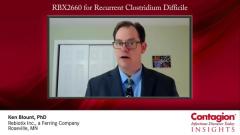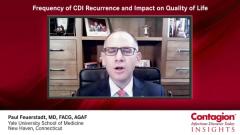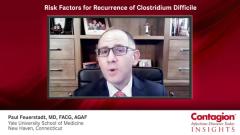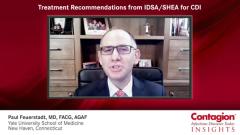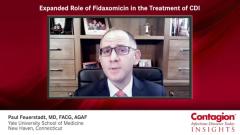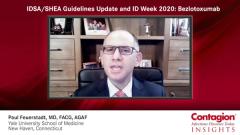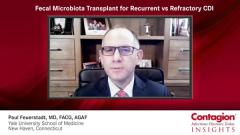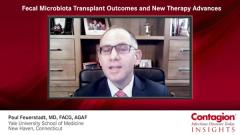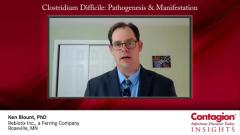
IDSA/SHEA Guidelines Update and ID Week: Bezlotoxumab
Episodes in this series

Transcript:
Paul Feuerstadt, MD, FACG, AGAF: There was one other significant update to the IDSA/SHEA [Infectious Diseases Society of America/Society for Healthcare Epidemiology of America] guidelines that was put forward at ID [Infectious Diseases] Week in 2020. That was a recommendation stating that bezlotoxumab should be considered in any individual with at least 1 risk factor for recurrence of C difficile [Clostridioides difficile] infection. Why is that? What are the data behind this?
The data behind this comes from 2 prospective, randomized controlled trials entitled MODIFY I and MODIFY II. These were published a couple of years ago. In these trials, 386 people were randomized to receive bezlotoxumab in MODIFY I, and 395 patients to receive bezlotoxumab in MODIFY II.
What is bezlotoxumab? Bezlotoxumab is a fully humanized monoclonal antibody designed to bind toxin B in a specific manner. By binding toxin B it theoretically decreases rates of recurrence, and it does that in prospective randomized controlled trials. Within the original MODIFY I and MODIFY II trials, there were other groups. If you’ve read the literature or you’re aware of the literature, one of those groups was actoxumab, a fully humanized monoclonal antibody to toxin A, and a combination of bezlotoxumab and actoxumab. Actoxumab wasn’t as efficacious as was expected, so this product didn’t come to market. And we’re going to limit our discussion on that today and focus solely on the placebo arms and the bezlotoxumab arms.
Within those prospective randomized control trials, the groups that received placebo in MODIFY I had a recurrence rate of 27% versus 16% in the group that received bezlotoxumab. In MODIFY II, recurrence rates with the placebo arm were 25%, and with bezlotoxumab, 15%. It’s essential to understand that bezlotoxumab is a one-time infusion given in addition to a standard of care antimicrobial, and that’s how it was administered within these studies.
Now, within these studies they also looked at risk factors for recurrence: age over 65, any history of C difficile infection, any immune compromised state for the patients, the hypervirulent strain, NAP1/B1/027 strain, or severe infection. Overall, there were trends for decreased rates of recurrence across the board; however, in the age over 65 group, both studies achieved statistical significance in the subgroup analysis, with the number needed to treat to reduce recurrence in 1 patient, of 6. That’s truly remarkable. That became the foundation for these recommendations that I just put forward of using bezlotoxumab.
Where did they come up with that 1 risk factor for recurrence? They did a subgroup analysis, published by Dale Girding, MD, et al, that looked at these original phase 3 prospective randomized controlled trials and put them together. When they looked at patients who had 1 risk factor for recurrence from the list that I just put forward, the group that received placebo recurred 31.3%, the group that received bezlotoxumab, 17.1%. When patients had 2 risk factors for recurrence, recurrence rates in placebo were 41.1% versus 26.9%. Three or more risk factors for recurrence, 46.1% with placebo, versus 21.2% with bezlotoxumab. The more risk factors you have, the more effective the bezlotoxumab is. But we see that even with 1 risk factor for recurrence, bezlotoxumab nearly cuts in half the recurrence rates.
At ID Week in October of 2020, a nice abstract was put forward looking at the real-world practical usage of bezlotoxumab. Within this analysis, they looked at 120 individuals. They compared a group of individuals who received either standard of care antimicrobials alone between January of 2015 and December of 2017, or standard of care antimicrobials plus bezlotoxumab, the fully humanized monoclonal antibody one-time infusion, given in addition to that standard of care antimicrobial. That group was assessed from September of 2017 to September of 2019. Overall, 47 individuals received standard of care antimicrobial plus bezlotoxumab, and 73 individuals received standard of care antimicrobial alone. They then looked at the 90-day recurrence rates, and overall, bezlotoxumab made a significant difference. The group that received bezlotoxumab recurred 12.8% of the time, versus 42.5% in the group that received standard of care antimicrobials alone. A statistically significant difference, but a practical real-world data support for the IDSA/SHEA guideline update for individuals who have C difficile infection that have 1 risk factor for recurrence, which was the group that was studied in this analysis, showing a remarkable difference from 12.8% to 42.5% for rates of 90-day recurrence. Following this provisional update to the IDSA/SHEA guideline, we should strongly consider using bezlotoxumab in a cohort of patients who have C difficile and 1 risk factor for recurrence.
Transcript Edited for Clarity
Newsletter
Stay ahead of emerging infectious disease threats with expert insights and breaking research. Subscribe now to get updates delivered straight to your inbox.


